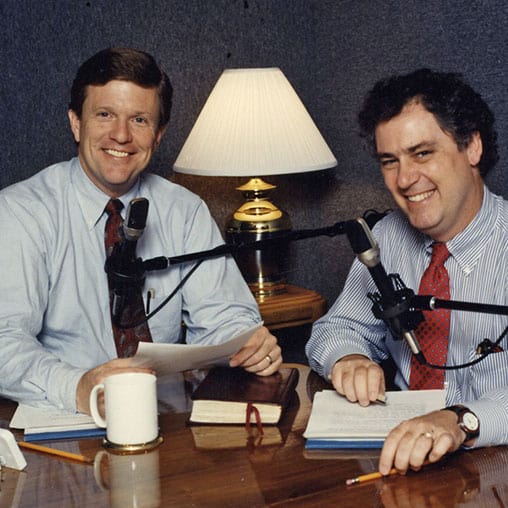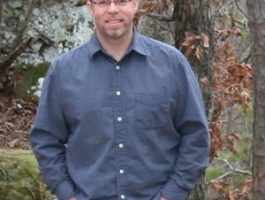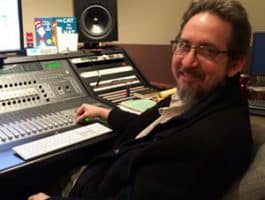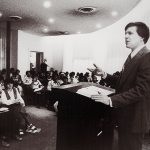
25 Years of Help and Hope
The message was vital; the challenge was how to spread it far and wide. The answer? A national radio program called "FamilyLife Today."
Show Notes
About the Host
About the Guest
-
The message was vital; the challenge was how to spread it far and wide. The answer? A national radio program called "FamilyLife Today."
-
Dave and Ann Wilson
Dave and Ann Wilson are hosts of FamilyLife Today®, FamilyLife’s nationally-syndicated radio program. Dave and Ann have been married for more than 38 years and have spent the last 33 teaching and mentoring couples and parents across the country. They have been featured speakers at FamilyLife’s Weekend to Remember® marriage getaway since 1993 and have also hosted their own marriage conferences across the country. Cofounders of Kensington Church—a national, multicampus church that hosts more than 14,000 visitors every weekend—the Wilsons are the creative force behind DVD teaching series Rock Your Marriage and The Survival Guide To Parenting, as well as authors of the recently released book Vertical Marriage (Zondervan, 2019). Dave is a graduate of the International School of Theology, where he received a Master of Divinity degree. A Ball State University Hall of Fame quarterback, Dave served the Detroit Lions as chaplain for 33 years. Ann attended the University of Kentucky. She has been active alongside Dave in ministry as a speaker, writer, small-group leader, and mentor to countless wives of professional athletes. The Wilsons live in the Detroit area. They have three grown sons, CJ, Austin, and Cody, three daughters-in-law, and a growing number of grandchildren.
-

Barbara Rainey
After graduating from the University of Arkansas with a Bachelor of Arts degree in history, Barbara joined the staff of Cru® in 1971. With her husband Dennis, whom she married in 1972, the Rainey’s cofounded FamilyLife®, a ministry committed to helping marriages and families survive and thrive in our generation. Barbara is a frequent speaker and guest on FamilyLife Today®, FamilyLife’s award-winning nationally-syndicated daily radio broadcast. She is the author or coauthor of...more
Dennis Rainey
Dennis Rainey cofounded FamilyLife®, a ministry of Cru®. Since the organization began in 1976 through 2017, Dennis’ leadership enabled FamilyLife to grow into a dynamic and vital ministry in more than 109 countries around the world helping families discover the joy God intended for their relationships with God, spouse, and kids. Dennis has authored or co-authored more than 35 books, including best-selling Moments Together for Couples and Staying Close and has received two Golden Medallion...more
Emmitt Fowler
Emmitt Fowler was the Director of Broadcast Relations at FamilyLife. Emmitt studied radio communications at Grace University in Omaha and has over 20 years’ experience in the radio industry. Prior to FamilyLife, Emmitt’s diverse background includes Christian radio station manager, business owner, and bi-vocational pastor. Emmitt and his wife, Jane, have been married since 1987 and live in Little Rock, AR. They have a son and daughter-in-law in Minneapolis, MN and two adult daughters in Litt...more
The message was vital; the challenge was how to spread it far and wide. The answer? A national radio program called “FamilyLife Today.”
25 Years of Help and Hope
Bob: The very first time anybody heard FamilyLife Today on the radio was at 7:30 in the morning, Eastern Time, in Washington, DC, on November 9, 1992.
[Previous Program]
Following is FamilyLife Today broadcast number 001. Program follows in four—three—two—
Dennis: Isaiah 53:6: the prophet Isaiah said, “All we like sheep have gone astray, each of us to his own way.” If I had one wish that I could wave a magic baton over my own life, my kids, Barbara, and each and every listener today, it would be if we could eradicate selfishness.
1:00
Bob: This is FamilyLife Today, with our host—bestselling author and conference speaker—Dennis Rainey. I’m Bob Lepine, inviting you to stay with us for a look at FamilyLife Today.
[Studio]
Dennis: I remember the first day the broadcast was aired. It was a Monday. We all gathered together in the call center, and it was not a formal call center.
Bob: It was a room with seven phones in it.
Dennis: Was it just seven?!
Bob: I think so.
Dennis: I didn’t know how many we had.
Bob: Right.
Dennis: We gathered around those phones and waited for them to ring, and they rang! And they rang again. And they rang all day. At the end of the day, we had received 44 phone calls.
Bob: This is FamilyLife Today on Thursday, July 28th. Our host is the President of FamilyLife®, Dennis Rainey, and I'm Bob Lepine.
2:00
There have been thousands of FamilyLife Today programs that have aired since that very first one in November of 1992. We’ll spend some time exploring the history of this radio program today. Stay tuned.
And welcome to FamilyLife Today. Thanks for joining us on the Thursday edition. While we are here talking on FamilyLife Today, our staff is assembled today. We are spending time celebrating, as a staff, 40 years of ministry. We’ve gotten to the point in history, where what you’re listening to today was first birthed—FamilyLife Today, which came on the air November 9, 1992.
Barbara, I’m just curious: do you remember when the first conversations about radio were had—
Dennis: Oh yes; she does. [Laughter]
3:00
Bob: —around the dinner table?
Dennis: She hit me on the head with an anchor. [Laughter] It wasn’t applause; it was—
Bob: It was full speed ahead?
Dennis: —it was not.
Barbara: No; it was, “We need to think about this.” I don’t remember exactly when he first mentioned it; but I do remember thinking: “Wow! This would be a really big deal / this would take a lot more time. It’s not like a conference, where you go speak and then you go back home.”
Bob: Right.
Barbara: Radio is every day—every day, every day, every day—and I also knew that being on radio would put our lives and our family in front of a whole lot more people.
Bob: You have both always been very transparent about your life, your family, your marriage; but it is one thing to be transparent with a group of 400/500 couples in another city and then fly home. It’s another thing to go on national radio and say, “We had a fight the other night.”
Barbara: Yes; it’s very different. So, I took a pretty big gulp. I really had to think about it a lot / I prayed about it a lot.
4:00
I wanted to know for sure, before we said, “Yes,” to this, that God was in this and this was what God wanted us to do, because if He wanted us to do it, I knew we would be alright; but I wanted to be confident that this was His call for our lives.
Bob: Dennis, this was not something that you had any great yearning for. It was really leadership team at FamilyLife that was asking the question, “How can we have more influence in a culture that is rapidly devolving when it comes to marriage and family?”
Dennis: Yes. We had several thousand volunteers at our conferences, all around the country. Our leadership team said: “You know, we have a ground force / an army on the ground. We need an air force, and we need something that makes a bigger difference in marriages and families and increases our reach.” It wasn’t a conclusion that this would be a success. As you know, Bob, a lot of radio programs have started over the years, and they’re no longer in existence.
Bob: There were a number of indicators / fingerprints-of-God moments—that’s what you’ve always referred to them as—markers that God was saying, “This is what I have for you.”
5:00
The first came—
Dennis: Well, the first was Barbara. [Laughter]
Bob: When she said, “Okay”?
Dennis: It was. She was okay with doing it because I would not have ventured out if she had not felt and agreed with me, “Yes; I think we can do this.”
Bob: You had a conversation with the people who helped launch Focus on the Family®, Insight for Living with Chuck Swindoll, Grace to You with John MacArthur, and a number of other well-known Christian radio ministries—our friends at Ambassador Advertising. They were routinely being talked to by people who said, “We’re interested in starting a radio program.” When you called and said, “We’re thinking about it,” you didn’t know that they had a lot of people who were calling them. You just knew that, when they said, “We’d like to explore this with you,” it was something unique.
Dennis: And I didn’t realize, Bob—they’d said, “Dennis, do you realize how many Christian leaders have come to us, over the past five years, to start Christian radio broadcast?” I said: “I have no idea—five, six, seven / over a five-year period?”
6:00
They said, “Fifty.” They said, “Do you know how many we’ve said, ‘Yes,’ to?” I said, “No idea.”
Now, Ambassador Advertising was, then and is today, the number one syndicator of Christian broadcast in the country. I had a little audition with Al Sanders, who’s kind of the grandfather of Christian radio. I guess I must have passed his audition because, at the end of the day, they said, “We’d like to do this.” That was the second answer to prayer, after Barbara. [Laughter]
Bob: The next answer to prayer came when a donor / a friend of the ministry sat down and wrote what was, at that time, the largest check we had ever received as a donation to this ministry.
Dennis: I’ll never forget sitting in my office, seated across the room from a couple, who’d flown in from Texas—who have since become very, very dear friends—and not just because they gave financially, but just because of their interest in Barbara’s life, mine, our family. We’ve shared a lot of life together.
7:00
This couple came in to FamilyLife and said, “What do you have that needs to be funded?” We said, “Well, we’d like to do a parenting conference.” They said, “What else do you have?” I said: “Well, we’d like to start this radio broadcast in the future. We have a little money saved at the ministry, but don’t have it all.”
A Christian broadcast like this is like a manufacturing process. It is literally 180 steps from the time a broadcast idea is generated to the time it ends up on air, and we needed that money. We didn’t know how badly we needed it.
They said: “Well, okay. Thanks,” and flew off. And then I thought, “Well, that was interesting.” They called back the next day and said: “You can go do your parenting conference. Just don’t tell anybody.”
8:00
Well, giving a gift / a sizable gift to a ministry like that—I didn’t tell people who gave the gift—but it became apparent in our small ministry, here in Little Rock, that there had been a gift given that enabled us to go do our parenting conference.
Bob: And they knew who’d been visiting recently.
Dennis: And they knew who was here. I had to call the couple to say: “Hey, folks found out. I’m sorry. I promised you I’d keep it a secret, but we weren’t able to do that.” There was silence on the other end of the phone. I offered to send the money back if it needed to be; and they said, “Well, you know, it was probably unfair to give you a gift of that size and ask you to keep it a secret. Besides, you can go do radio program too.”
I have to say, I wept. Bob, it was another illustration of many times that God has His signature to us, here at FamilyLife.
Bob: Well, as it turned out, we had to scramble for our first radio programs.
Dennis: Well, Bob, you’re really leaving out something pretty important here.
Barbara: I was thinking the same thing.
Dennis: Why don’t you tell him what he’s leaving out?
Barbara: He’s leaving out the other answer to prayer, which would be number four—and that is God supplying Bob Lepine to be the co-host because I remember that Bob was very content—[Laughter]—
9:00
—is that right?—in your previous dwelling place in San Antonio, Texas?
Bob: I was happy.
Dennis: He liked the Mexican food in San Antonio.
Bob: And the Spurs.
Barbara: And the basketball; that’s right—and was not very interested, initially, in coming—but his wife and his mother both thought it would be a very good fit.
Bob: Part of the confirmation for us that God was in this was we weren’t giving in to fleshly desire. It wasn’t something that we thought: “Man! It would really be fun to leave San Antonio, move to Little Rock, and do this.” There was not a lot in me saying, “That’s what I’d like to do.” But there was a clear sense for both of us—that God’s hand seemed to be on this. This seemed to be His direction for our lives.
Barbara: Yes.
Bob: As I’ve told friends, it is better to be in the will of God in Nineveh than to be in the belly of the big fish.
Barbara: That’s right.
Bob: So we moved to Nineveh, Arkansas, back in 1992. [Laughter] Within a couple of months, we had the opportunity to launch a program, ahead of schedule.
10:00
Dennis: On the fifth miracle that occurred.
Bob: We had an opportunity to go on 22 stations at some great times—
Dennis: —with the number one owner of Christian radio stations in the country, Salem Broadcasting.
Bob: They had openings—they called and said, “Can you be ready?” We hadn’t recorded anything, but they needed a program.
Dennis: We didn’t even have a name for it!
Bob: Well, in fact, we had a staff meeting, not long ago, as we were celebrating a milestone, here at FamilyLife Today. Somebody asked about the name of the program. Emmitt Fowler, who works with us here, was hosting that day. This is kind of interesting how this came up. Listen to this clip.
[Recording]
Emmitt: Bob, you mentioned the name of the program. You know, it’s amazing what you can find if you dig deep enough.
Bob: Oh yes; yes.
Emmitt: And I actually found a list of suggested names of a program from that meeting in Bob’s—
Bob: It’s amazing what you can find if you fabricate too. [Laughter]
11:00
Emmitt: There was a list of names that were given—as I understand it—pretty serious consideration, and yet were rejected. I thought I’d share just a few of those with you. The first that I found was FamilyLife Yesterday. [Laughter]
Bob: Yes. We said, “No,” to that one.
Emmitt: I think that was probably a good call.
The Odd Life of Dennis and Bob. [Laughter]
Focus on the American Family Radio.
Bob: Yes; no, we—[Laughter]
Emmitt: That may have caused some confusion.
Bob: Yes. [Laughter]
Emmitt: I’m really surprised this next one didn’t make the cut.
Bob: Yes; me too.
Emmitt: How to Speak Ozarkian. [Laughter]
Dennis: We trained the country in that!
Emmitt: Yes, yes; you did. [Laughter]
Dennis: Still are, by the way.
Bob: Yes; yes.
Emmitt: How about The Marriage and Family Emphasis Show.
Bob: Oh, yes.
Dennis: Oh, yes.
Emmitt: That sounds a little clinical to me.
Bob: That grabs you; doesn’t it?
Emmitt: Yes. That’s—yes. This next one—
Bob: Get it out of your system.
12:00
Emmitt: It just says—and this is actually the one on the list that I really thought would stick—
Bob: Yes.
Emmitt: I’m really surprised it didn’t.
Bob: Yes. I’m shocked; yes.
Emmitt: Yes. Bob Lepine and That Other Guy. [Laughter]
[Studio]
Bob: So there you go—that’s a little of how the program naming—we didn’t sit in front of a whiteboard—we brainstormed names / we came up with names—
Barbara: And none of those names were really viable. [Laughter]
Bob: No; no. But FamilyLife Today stuck. We were on the air four weeks after we had come up with that name, and—
Dennis: I wish our listeners could have seen—we did not have the vision for this, Bob, to take a picture of the place where we did the first broadcast. We called it Bethlehem.
Bob: Actually, I think we do have some pictures—we’ll put them on the website.
Dennis: This was right across the road from Asher Auto Salvage.
Bob: It was a garage that had been converted into a recording studio—
Dennis: —roughly speaking.
Bob: —and it had burlap and egg crates on the walls. Here’s what I remember—it cost us $30 an hour to record.
13:00
Dennis: And they gave us half-price—it was $15.
Bob: It was $15 an hour—
Dennis: That included the technician.
Bob: We launched in November of 1992 on 22 radio stations. Today, FamilyLife Today is heard on a network of stations that exceeds more than a thousand stations and outlets, all across the country, and has now moved into foreign countries as well.
Dennis: I remember the first day the broadcast was aired. It was a Monday. We all gathered together in the call center, and it was not a formal call center.
Bob: It was a room with seven phones in it.
Dennis: Was it just seven?! I didn’t know how many we had, but we gathered around those phones and waited for them to ring. And they rang! And they rang again. And they rang all day. At the end of the day, we had received 44 phone calls.
Bob: And part of it’s because we offered a resource that we hadn’t created yet. That was not one of our greater moments.
14:00
We did have some conversation as we were meeting with our staff about the core of the ministry and what we were about when we started. What we’re about today hasn’t changed over the last two-plus decades on FamilyLife Today. Listen to this clip.
[Recording]
Emmitt: You talk a lot about the program, from its very foundation, being biblical, practical, and relevant. Why were those three things the foundational building blocks that you chose, and why do they remain key to the program today?
Dennis: Well, if it’s not biblical, I don’t have anything to say. I mean, it’s not a matter of happy homes—it’s a matter of godly homes and pointing people to Christ. If we don’t talk from the Scripture, then people are building their houses on the sand. I think practical has always been a part of what FamilyLife’s all about.
15:00
We want to help people apply the Scriptures to their lives. Then relevance is—we’ve always wanted to be market-sensitive; but again, let the Bible speak to where people are, and let them apply it to their own marriages, families, and singles’ lives too.
Bob: You know, really, the radio’s just a reflection of what the FamilyLife ministry was before radio started. The Weekends to Remember were practical, biblical, relevant, authentic, and transparent. All of those characteristics just transferred through. It’s really a reflection of Dennis’s leadership, and Dennis’s life, and how he’s ministered, and how he’s modeled that for others, who were speakers, and then modeled it on the radio. That’s how he’s done ministry and taught us to do ministry.
Emmitt: Speaking of modeling on the radio—[Laughter]
Bob: Oh, yes.
Emmitt: —we just happen to have a time when Dennis gave some very—I’m not sure how—I guess it was biblical advice—certainly practical advice and maybe even relevant, depending on your marriage situation—which people will understand when they hear in a moment.
16:00
You gave some very wise advice to Lou Priolo when he was here.
[Previous Program]
Bob: So, if your wife comes to you and says, “Does this dress make me look fat?” what do you say, Lou?
Lou: “Yes, of course.” You say, “Yes.”
Dennis: You do?
Lou: I do.
Bob: If she says, “Does this dress make me look fat?” and you’re about to go out somewhere and you just say, “Yes, it does.”
Lou: Well, you could say—you know, you could say, “Sweetheart, it’s not the most flattering dress.”
Dennis: There you go! There you go! I was going to say: “Lou, far be it from me to correct you, as the counselor, at this point—
Lou: I said I would say it. [Laughter] I’m a New Yorker. Your wife is from the South, where you all have this polite stuff going on.
Bob: Bless your heart. [Laughter]
Lou: Polite.
Dennis: Well, you’ve been talking about biblical counsel. I would give you some biblical counsel in return. I would say, speaking the truth in love—and there is a way to speak the truth—
Lou: Okay; so, teach me. You counsel me: “How would I tell my wife in this situation?”
17:00
Dennis: Well, I would just say to her, “You know, sweetheart, you have got other dresses that make you look better.”
Lou: I agree; that’s a much better way to say it.
Dennis: You know, it’s—I just wouldn’t say, “Yes.” [Laughter] I mean, that would not be good—in the south or in the north! I’m afraid that the cold winds blow wherever that goes.
Lou: I never respond that way. [Laughter]
Dennis: I want to call your wife! [Laughter]
[Recording]
Emmitt: And now you know why—[Laughter]—now, you know why Dennis and Barbara have been married 40 years.
Dennis: Yes; right.
Emmitt: That was good advice. Good advice.
[Studio]
Bob: I remember, as we listen back to that—I remember the first time we sat down to record. You were giving an illustration, and you talked about the fact that the previous week you and Barbara had had an argument. I remember thinking to myself: “Okay, we may need to edit that out. I don’t know if you want to go on national radio and talk about the fight you had with your wife a week ago.” I asked you about it afterwards.
18:00
Dennis: That’s actually how you asked me: “Dennis, this is real. Do you want to tell that story?”
Bob: And you said, “Well, number one, it’s true; and number two, I’ve learned over the years that people are ministered to more by how we’ve dealt with our mistakes than by all the wisdom that we can muster to share.”
Dennis: And they’re also looking for authenticity. I think people know we’re broken; and so they’re looking for, “How do you apply the Bible to our brokenness in our situation?” That’s all I want to do—is provide help and hope and not have some pious illustration of some perfect marriage that only exists—well, it doesn’t exist in heaven because we’re not going to be married in heaven. [Laughter]
Bob: Somebody asked, during our staff meeting, if we knew how many words we’ve recorded in our 20-plus years of FamilyLife Today. Well, let’s listen to this.
[Recording]
Emmitt: Hey, Keith, grab a microphone there just really quick. I’m going to have you give some of these numbers that you and I were discussing earlier.
19:00
How many words do you estimate that you have heard Dennis and Bob utter?
Keith: Different words?[Laughter]
Dennis: Keith / Keith—you really hurt me on that one. I know I have a limited vocabulary, but—Laughter]
Bob: Are you counting yesterday and yester-d as two words? [Laughter]
Dennis: Or progroom and program! [Laughter]
Bob: Yes—two different words. [Laughter]
Keith: One day, when I was really busy, I decided I would figure out how many words they’d said. So I have a little spreadsheet—I click on it every day, and I think the number right now is 24 million-ish—
Emmitt: Twenty-four million words that you’ve listened to.
Keith: —that make it on the air.
Emmitt: Right; right. You know, I don’t make this stuff up—I just read what’s on here. [Laughter] But the number I have is 24,568: “No doubt about it, Bob”s. [Laughter]
20:00
Dennis: That wasn’t funny! It’s going to go downhill from here!
Emmitt: Boy; you know what?
Dennis: Yes; you know what?
Emmitt: It gets worse! Thirty-three thousand, one hundred forty-three: “You know what?s” [Laughter] But he [Bob] doesn’t get off the hook—I have 29,339: “Mm. Mm. Mm”s.
Bob: Mm. Mm. Mm.
Emmitt: He’s a very agreeable person.
Dennis: No; he had indigestion. [Laughter]
[Studio]
Bob: Well, and in all of those words—you always have a few bloopers. We’ve had our share of bloopers, but probably our favorite blooper—
Dennis: This is our favorite that we can air.
Bob: We were innocent parties to this particular blooper. We had a guest, our friend Max Lucado, who came on FamilyLife Today, and—
Dennis: There’s a reason why he’s sold 100 million copies of his books.
21:00
Bob: Yes. Yes; listen to this.
[Recording]
Emmitt: You remember—just a few months ago, Max Lucado was here. I want you to listen to a moment in the studio with Max Lucado. It was actually Max that needed fixing, as he has some trouble remembering who wrote the Bible—more accurately, he has trouble remembering who didn’t write the Bible.
[Previous Program]
Max: Across the table, the father winked at me and the mother smiled at me. They reached over me, petted me, and he thought, “I may be in a place called home.” They adopted him, and he went on to grow up in that home and to lead a wonderful life. He gave his heart to Christ and became a great Christian man.
The whole reason I put that story in the Bible is because—[Laughter] The reason Moses, and Paul, and I collaborated on that book—[Laughter]
[Beep]
Keith: Take two.
Max: The reason I put that story in the Bible is because that’s a story—
Bob: You said it again. [Laughter]
22:00
Max: Someone in heaven is laughing. [Laughter]
[Beep]
Keith: Take three.
Dennis: Okay. Now try.
Max: I got it.
The reason I put that story in my Bible is because that’s—[Laughter] Ohh!
Bob: Now you’re stuck on putting that story in the Bible.
Dennis: Say “book.”
Max: Book / book!
Dennis: Say it again.
Max: Book!
[Beep]
Keith: Take four.
Max: The reason I put that story in my book is because that’s a picture of grace. That is a picture of grace—that we have been adopted. In fact, this is biblical language; isn’t it?—that we have been adopted into the family of God / that God has made a covenant with us to bring us, and let us sit at the table, and spend eternity with Him.
Bob: It’s a picture of grace that God didn’t strike you dead for putting a story in the Bible. [Laughter] We can cut that out too. [Laughter]
[Studio]
Bob: Max is a good sport.
Dennis: People enjoy our laughter.
23:00
If you only knew how much we laughed and left it out of the broadcast. [Laughter]
Here’s what I want to say—I just want to say, “Thanks,” first of all to you, the listener, for listening to our broadcast. We have a lot of folks who’ve listened to us since 1992. You’re who we do it for. I met somebody just yesterday, who listens to the broadcast. It’s always good to meet a radio listener because I’m here in the studio, and Bob doesn’t listen to me on most occasions. [Laughter]
The other thing I want to say, in all seriousness, is—I also want to say, “Thanks,” to those who are Legacy Partners and donors to FamilyLife Today. Thank you for your donations and being stakeholders and partners in this ministry. We’ll let heaven settle the score of who gets the credit for what; but I have a feeling, when we get to heaven, there is going to be some real heroes of the faith who fueled and funded a broadcast that stood strong on behalf of the family in a day that doesn’t—sad day in our country, frankly. [Emotion in voice]
24:00
I just want to say: “Thanks for keeping us on the air because that’s not a foregone conclusion after more than two decades of broadcasting. It takes a lot of you to do that, and I just want you to know I really appreciate you and want to thank you for standing with us.”
Bob: Well, and there’s been a lot of ministry that’s happened since FamilyLife Today went on the air more than two decades ago, and we’re going to explore some of that tomorrow, so I hope our listeners can be with us for that.
I want to thank our engineer today, Keith Lynch, along with our entire broadcast production team. On behalf of our host, Dennis Rainey, I'm Bob Lepine. We will see you back tomorrow for another edition of FamilyLife Today.
FamilyLife Today is a production of FamilyLife of Little Rock, Arkansas.
Help for today. Hope for tomorrow.
______________________________________________________________________________
We are so happy to provide these transcripts to you. However, there is a cost to produce them for our website. If you’ve benefited from the broadcast transcripts, would you consider donating today to help defray the costs?
Copyright © 2016 FamilyLife. All rights reserved.
1






